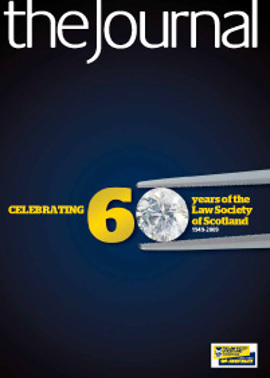Target 2010

History is likely to see our current times as a geopolitically epochal moment. Just as the end of the 19th century marked the turning point in the fortunes of the British Empire, so the crisis of 2008-09 will be seen as confirmation of the decline of the Western and particularly American post-war dominance. It seems that only by many countries co-operating will the crisis be resolved.
The 60th anniversary of the Law Society of Scotland is unlikely to be given quite so much attention by historians. The anniversary coincides with a period of substantial and deep reaching change within our economy and society. While the anniversary of the Society is something to celebrate, unfortunately the current travails of the profession are a cause for concern.
I believe (I hope wrongly) that the current economic problems conceal even greater challenges for a large part of the Scottish legal profession. On 9 May I will be speaking at the Society’s “Law in Scotland” conference, under the title “Survival of the Fittest! How the internet can be the saviour of Scottish legal practices”.
I will argue that the Scottish profession (especially those involved with property and general work) is caught between the forces of commoditisation on the one hand and a severely altered market on the other. The widespread involvement of solicitors with estate agency work, in addition to normal property related work, exacerbates the Scottish profession’s exposure.
Given that economists and experts, for the most part, failed to forecast the current economic problems accurately, one is rather wary of attributing too much weight to forecasts. One factor does seem certain: the recession is likely to be long and damaging. Our best hope is that it will be “U-shaped”, and that the dreaded Japanese style “L-shaped” recession can be avoided.
Peak to trough
Before we feel too sorry for ourselves, the reality is that many within the Scottish legal profession have benefited greatly from the explosion in property work over the last 10 years. A quick look at the Cost of Time survey shows that average incomes of partners have doubled since 2000. Inflation over that same period was just over 16%, resulting in the incomes of partners in Scotland beating inflation by over 80%.
Consequently the increased incomes of many Scottish legal firms and solicitors have been driven by greater volume in both domestic and commercial conveyancing. At the peak in 2006 there were nearly 16,000 house sales in one month; by January 2009 that figure was under 4,000. At the time of writing, activity is increasing but from this very low base. It does not take Stephen Hawking to calculate the loss of income within the profession.
The problems resulting from a sharp reduction in the supply of work go much further than a diminution in the size and incomes of the current profession. The number of students taking law degrees through Scottish universities has risen substantially. While many of those students will seek work outside the profession, a large number are carrying out their studies with a view to joining the Scottish profession. The number of available places for trainees and young solicitors will be much reduced. Furthermore we have seen a growth in the number of paralegals, with or without formal qualifications. What will happen to these people?
Change of course
Throughout recent years there has been a welcome move to create greater transparency within the provision of legal services. A consequence is that this will attract large companies with the ability to commoditise services. Given the decimation of the financial services industry, these companies will seek to create alternative markets providing services that are currently supplied by both the Scottish and English legal professions.
Problems go beyond property based work; other areas are also under considerable pressure and income that derives from public funding is not likely to escape the straitened times that we are entering.
A sizeable portion of the Scottish legal profession is small firms. Their ability to challenge commoditisers is limited; a substantial reduction in the size of the profession is the only likely outcome. What can be done to counter these worrying conclusions?
My argument is that the profession needs to take a radically different course, if it is to survive in roughly its current form and also meet the dreams of the next generation of young lawyers and paralegals.
Increases in both volumes and fee levels are likely to be limited (at best), so a substantial swathe of costs needs to be removed from the practice of law. As a prescription, this is not rocket science, but the reaction of most firms is to reduce their expensive staff and lower their gearing. Many smaller firms already have gearing that is far too low to operate a business profitably within current structures. Partners in some firms will need to ask themselves whether their contribution is satisfactory.
Common good
Given my background of using technology to deliver legal services, it is perhaps not surprising that I see the answer as technologically based. My proposition is that a lateral use of available internet based technology and a different approach to working would revolutionise the economics of legal work in Scotland.
I will outline to the conference what steps can be taken now to put these changes into action. To do this I need to assess the current attitude and experience of the Scottish profession to technology and the internet. The Society generously agreed to include a link within their April e-bulletin to an e-survey which I prepared. If you have not already completed the online survey, which only takes a couple of minutes and collects no personal information, I urge you to complete it now (a link to the survey can be found in the panel on this page).
So how does a survey move us forward? To answer that I need to mention briefly the two main elements of my proposed suggestion:
In areas such as conveyancing, property work and other work where there are at least two firms involved, the approach to work should be structurally co-operative rather than adversarial. Of course, protecting the interests of one’s own client is paramount, but somewhat conversely this can be achieved far more effectively within a co-operative system.
The Scottish profession create an internet based common working platform where the cost of transactional or case work involving more than one firm can be substantially reduced and the work dealt with in a more systemised fashion.
My suggestions do not mean that fees should be reduced, but rather profit margins can be maintained at a higher level. It will be the market that sets the rates for legal work, but if those rates are below the marginal cost for some firms, they will go out of business. The fundamental priority is to reduce the marginal cost of carrying out legal work without compromising quality and the future of the profession.
The enabling element here is the common platform coupled with some common sense; the Scottish legal profession would themselves reap the benefits of commoditisation (rather than suppliers external to the profession providing services over the internet or otherwise, at rates with which the majority of the profession simply could not compete).
Platform for success
I suppose a good analogy for the concept is the solicitors’ property centres; to a degree those centres benefit from “network advantages” where a central platform lowers costs, enables higher quality and attracts participants because of its universality. At the same time competing solicitors co-operate to create a bigger pie for all. E-bay is the best example of the network advantage.
At the conference I will announce the results of the survey and my analysis. For those who would like a copy of the analysis they can request one within the survey itself or they can email me directly. I hope the survey will indicate that the profession is ready to make this jump.
I am conscious that I have not provided much insight as to how these ideas would work in practice. It would take rather too long for an article of this length and I will try to cover some of these practicalities at the conference. One point, worth making now, is that I do not see the platform as being owned or provided by a commercial entity. The platform should belong to its users with profits being shared according to use.
I hope it would be realistic to have such a system live by the beginning of 2010, provided there is a willingness on the part of the profession and the Society to promote and invest in this new platform. The Society can do much to promote these ideas by supporting modern thinking, for instance by insisting that all of its members must have email and internet capabilities. Placing all of the Society’s communication from a certain date online would surely save the Society a great deal of money which could help fund the development of the platform.
This current crisis needs to be responded to head on. Wishfully hoping that we will return to the good times would be the equivalent of the profession fiddling while Rome burns. There is a real opportunity to use this downturn to create promise for the future. As seems to be the case with the international financial crisis, it is only by working together that a prosperous future can be secured.
Jonathan Edwards, LawPracticeConsultancy.com, e: jonathan.edwards@ LawPracticeConsultancy.com . w: www.LawPracticeConsultancy.com .
In this issue
- Defining year
- At the heart of the debate
- In shape at 60
- Banks doing business
- To take us forward
- Striving after fairness
- Knowledge is protection
- The changing role of the law school
- Risk: nip it in the bud
- Close relations
- Conference keeps getting better
- Booming baby boomer
- Channel vision
- Variations on a theme
- Customer survey scores a plus
- Prepare for the upturn
- New look Society gets go-ahead
- Backing for "Wider Choice"
- Private client tax specialists recognised
- Law reform update
- From the Brussels office
- Target 2010
- Questions of our times
- Ask Ash
- Breaking the chain
- What will they do next?
- Sins of emission
- Scottish Solicitors' Discipline Tribunal
- Are we ready?
- Website review
- Book reviews
- Duty within bounds
- Change to fair
- Home reports update






